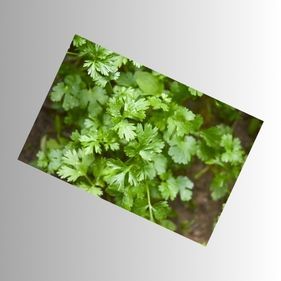From Kitchen Staple to Herbal Marvel
Welcome to the intriguing world of herbal medicine 🌿 where ancient wisdom meets modern remedies. 💚
[**This post is part of a spin-off from a post on the Medicinal Garden Kit, your gateway to creating your own "backyard pharmacy" and healing oasis at home. 🌱
Watch out for our next post as we discover the healing powers of more herbs.
For now - sit back, relax, and embark on a journey of discovery with us.✨]
🌿 Introducing the Healing Powers of Parsley 🌿
Did you know that the humble herb parsley goes beyond being a mere garnish on your plate ... It turns out that this vibrant green ingredient has been valued for centuries in the world of herbalism for its remarkable healing properties.
From boosting digestion to supporting respiratory health, parsley has found its place as a potent herb in holistic healing practices.
Join us as we delve into the ancient secrets and versatile uses of parsley in herbal medicine, unlocking its potential to enhance our well-being ... Get ready to be amazed by the power of parsley! 🌱✨
Overview of Parsley in Herbalism
What is Parsley?
Parsley (Petroselinum crispum) is a widely used herb in culinary and herbal medicine practices. It belongs to the Apiaceae family and is native to the Mediterranean region.

Parsley is known for its vibrant green leaves 🌿 and distinct flavor, making it a popular addition to various dishes.
Physical Characteristics of Parsley
- Leaves: Parsley has bright green, feather-like leaves that grow in clusters. These leaves are rich in aroma and flavor and are commonly used as a garnish or ingredient in cooking.
- Roots: The root of parsley is slender and white, often used less frequently compared to the leaves.
- Flowers: Parsley produces small yellow-green flowers that are arranged in umbrella-shaped clusters called umbels. These flowers are typically not used in herbalism.
- Seeds: Parsley seeds are small, oval-shaped, and brown. They have a strong flavor and are used in cooking and herbal remedies.
Varieties of Parsley
There are two main varieties of parsley commonly used in herbalism:
- Curly Leaf Parsley (Petroselinum crispum var. crispum): This variety has tightly curled leaves and is primarily used as a garnish due to its attractive appearance.
- Italian Flat Leaf Parsley (Petroselinum crispum var. neapolitanum): This variety has flat, broader leaves with a stronger flavor compared to curly leaf parsley. It is often preferred in recipes that require a more pronounced parsley taste.
Nutrients and Phytochemicals in Parsley
Parsley is packed with essential nutrients, phytochemicals, vitamins, and minerals that contribute to its therapeutic properties.
Some key components include:
- Nutrients: Parsley is a good source of vitamin K, vitamin C, vitamin A, iron, and calcium, among other nutrients.
- Phytochemicals: Parsley contains various phytochemicals, including flavonoids (such as apigenin and luteolin), carotenoids (such as beta-carotene and lycopene), and volatile oils (such as myristicin and apiol).
Functions and Uses in Herbalism
- Traditional Practices: In traditional herbalism ... parsley has been used to support digestion, promote urinary tract health, stimulate menstruation, and alleviate bad breath. It has also been used as a diuretic, antispasmodic, and anti-inflammatory agent.
- Modern Applications: Today ... parsley is valued in herbalism for its antioxidant properties, which help protect against oxidative stress and inflammation. It is often used as a natural diuretic to support kidney function and to aid in detoxification. Parsley is also believed to have antimicrobial properties and may help in managing bad breath.
Dosage and Safety Concerns
- Recommended Dosage: When using parsley for culinary purposes, there are no specific dosage guidelines. However, in herbal medicine, it is commonly consumed as an infusion or added to dishes. *The recommended dosage of parsley extract or tea is typically 2-4 grams per day.
- Safety Concerns: While parsley is generally safe when consumed in moderate amounts as a culinary herb, higher doses or concentrated supplements may not be suitable for everyone.
*Pregnant women should avoid consuming large amounts of parsley, as it has been associated with potential uterine stimulation.
**It is always advisable to consult with a healthcare professional before starting any herbal regimen.
Parsley-Derived Products
Several parsley-derived products are available in the market, including:
- Parsley Essential Oil: This oil is obtained from the seeds or leaves of parsley and is used in aromatherapy for its refreshing scent. It may also have antimicrobial properties.
- Parsley Supplements: Parsley extract and supplements are available in capsule or liquid form, often used to support kidney health, detoxification, and overall well-being. Ensure to choose reputable brands and follow recommended dosage guidelines.
*Please note that the efficacy of parsley-derived products may vary, and it is important to select high-quality sources from reliable manufacturers.
🌿 Embracing the Green Wonder: Harnessing Parsley's Healing Potential 🌿
The Takeaway
As we bid farewell to our exploration of parsley's role in herbalism, one thing becomes abundantly clear: this humble herb holds immense healing potential.
From its rich nutrient profile to its array of phytochemicals, parsley offers a wide range of benefits for our well-being.
Whether you use it as a garnish in your culinary creations or incorporate it into herbal remedies, parsley has proven itself as a versatile and powerful herb.
Your Next Move
So ... next time you reach for that sprig of parsley, remember its sacred place in ancient traditions and its ability to support our health.
Let us celebrate the green wonder that is parsley and continue to harness its remarkable healing potential ... 🌱✨
... embark on a holistic path toward improved health and vitality. 💚
If you want to explore even more about these and other treasures in herbal medicine 🌿 ...
Thank you for stopping by and reading along with us ...
Sources:
Disclaimer.
When you purchase through links on our site, we may earn an affiliate commission (that's how we stay in business). FirstFewFinds may use affiliate links to products and services on retailer sites for which we can receive compensation if you click on those links or make purchases through them. We hope you find the list of our first few finds useful and helpful. Each product on our list has been carefully chosen by our writers and all opinions are our own. Check your choices and enjoy finding exactly what you need!








